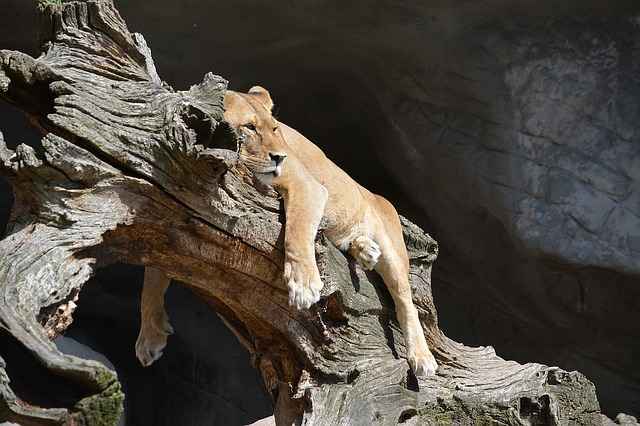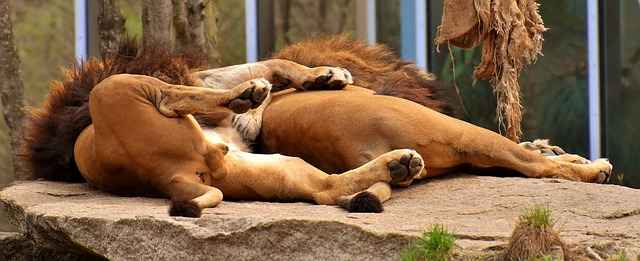 Most of their sleeping is done during the late morning, throughout the afternoon, and throughout the evening. They usually do not become active until night when the temperatures drop.
Most of their sleeping is done during the late morning, throughout the afternoon, and throughout the evening. They usually do not become active until night when the temperatures drop.
Lions will curl up under the shade of trees, bushes, or rock formations to sleep as shade from these places helps to provide lions with shade and a little bit of a reprieve from the hot sun.
However How much Exactly do they sleep?
How Much Do Lions Sleep?
Lions commonly sleep anywhere from fifteen to twenty hours each day. Female lions sleep 15-19 hours per day which less than male lions as they watch over their cubs and do all of the hunting for their prides. Male lions are much lazier and sleep longer than their female pride members at closer to twenty hours on any given day.
Much of this sleep is broken up by shorter “cat-naps” so to speak, with longer stretched of sleep after a meal. In fact, a lion can sleep for an entire twenty-four-hour period after it has had a hardy meal.
How Much Do Female Lions Sleep
Female lions or Lionesses are the hardest working members of their pride. Lionesses are the hunters of the family and work together to take down their prey. They also keep a watchful eye over they lion cubs throughout the day. Because of the hard work they do, the female lions only sleep for about fifteen to eighteen hours each day.
Hunting is a team sport for lionesses. To catch their prey that is often quite quick on their feet female lions work together. While some of their prey can be small, such as rabbits and birds. Lionesses are often chasing down much larger prey like elephants, cheetahs, buffalo.
This often means a whole lot of running and brute force for the team take downs. All that work requires the large amounts of energy that they gain by doing all of that sleeping during the day.
How Much Do Male Lions Sleep
Male Lions, in contrast to female lions, sleep far more. The male lion will sleep for eighteen to twenty hours a day. Male lions guard their pride, or families, territory. They will often laze around, while at the same time keeping an eye out.
Male lions will interrupt a “cat-nap” in order to chase off anything that comes into its territory, which may mean guarding and chasing things off of as much as one hundred square miles of territory.
Male lions pee along their territory and roar to deter other animals from coming into their space, but when those methods fail, a male lion will interrupt its nap to chase intruders off.
How Much Do Baby Lions Sleep
Lion Cubs may sleep as few as at twelve hours but as many as twenty hours. When they are first born, lion cubs spend much of their time eating and sleeping. Their naps are broken up mainly by the need to fill their bellies. As lion cubs get older, they become more energetic and begin splitting up their sleep with eating and playing. Eventually they develop the same sleeping habits as their adult pride members.
What Time Do Lions Sleep
Lions sleep the most during late morning, afternoon, and early evening. Lions spend early morning, late evening, and over night being active, though the bulk of their activities are nocturnal. The cool temperature of the night along with the dark night for cover add an extra layer of camouflage to their night hunts.
The dark also makes them harder to spot by predators that would typically seek them out during the day.
Lions who live in the plains have a harder time finding places to cool off and nap than lions that live in jungles or forested regions. These lions are more active because of the added hours of cooler temperatures.
Many zoos and lion rescues that are located in cooler climates have often found that their lions sleep as little as twelve hours a day because they are not faced with the need to save energy that the high temperatures in more natural habitats inflict upon them.
Do Lions Sleep at Night?
Lions do sleep at night some, but they do most of their hunting at night as well. The cooler temperatures make the physical strain of hunting more effective. Hunting in the heat burns more energy and can dehydrate lions more than that of a night hunt.
Lionesses are awake and active for about seven to twelve hours a day. When the pride has cubs, especially young cubs, lions sleep less and are more vigilant.
When cubs are first born, lionesses choose a safe space away from the rest of the pride to give birth and recover. This is because the female lion is very vulnerable during this time.
She is less equipped to defend herself, she will require more sleep that usual, and after the cubs are first born and for about the first eight to ten weeks after their birth both the female lion and the cubs will need lots of sleep to generate energy for nursing and caring for the cubs, recovering from their delivery, and to be strong enough to rejoin their pride a few months after delivery.
How Often Do Lions Sleep
Lions are often away early in the morning. The sleep or nap on and off from late morning to late evening. This is because they generally sleep through the hottest part of the day to preserve their energy and conserve their resources.
They are awake and active again late in the evening and most of the night. Their activities begin when the temperatures begin to drop, and things cool off. The coolest parts of the night are when lions sleep the least and take on the most activity. Hunting is most prevalent at this time.

Where Do Lions Sleep?
Lions can truly sleep almost anywhere. They can be found in the tall grass, under dense brush or bushes, beneath trees or fallen logs, in the shade of rock formations, cave openings, in trees, or in the rocky coverings near waterfalls, rivers, and other water sources.
Most often lions will seek out the slightly cooler temperature that can be found in these shaded places. This is especially common during the hottest parts of the day.
Lions are native to Africa, the middle east, and India. These places, globally, are extremely hot. In addition to the heat, many of the places that lions call home are also very dry climates.
This combination means that lions need a good deal of energy in order to seek out water, defend their territory and one another, and most importantly to hunt food so that their pride can survive. A lion’s sleep is key in its quest for survival.
Do Lions Sleep in Trees?
On the plains of Africa, lions will rarely if ever sleep in trees. The trees in that environment tend to be on the smaller side and often have dry, weak, or even brittle branches. However, in jungles and forests, it is entirely possible for lions to hang out and take a nap in the trees found there.
The jungles and forests are lush with greenery, are better hydrated than the African plains, and therefore offer robust, thick, and strong tree branches that can hold the weight of such a large cat. In addition to the cool and lofty perch they provide, it also adds the advantage of being able to see predators and prey from a higher vantage point.
Do They Sleep in Caves?
Lions don’t typically sleep in caves.
Caves, along with thick bush, and sheltered areas near water are among the places a lioness will choose to seek out when they are getting ready to give birth to their cubs though.
When giving birth and for the first few months of a lion cubs life both the lioness and the cubs are at their most vulnerable.
Caves and other protected or sheltered places give a female lion the security and safety needed during labor. Afterwards she and the cubs stay there for protection while they recover to give them the best shelter when they are missing the usual protection offered by the lions in the pride.
Do Lions Sleep Together?
Lion prides may sleep in close proximity, but they also tend to spread out a bit. Male lions will watch over the rest of the pride as a guard. Prides with multiple male lions most often do better at protecting because of multiple sets of eyes and ears keeping a look out.
This extends the life and health of the entire pride as well.
Female lions rest, while also keeping an eye on their young. When the female lion goes out for a hunt, male lions pick up the job of watching over the cubs that are too young to go hunting yet.
So, while lions and lionesses may sleep within the same territory, and often within sight of one another, it is common for them not to be cuddled up
Why do Lions Sleep So Much

In part, lions sleep a lot because they are a predator and they need to be well rested to hunt, chase down their prey, and ultimately kill their prey.
Sleeping allows lions to store up their energy. Most of the prey that lions hunt and eat are a lot faster than the lion is, move with agility, and stay on the run for extended periods of time like the gazelle. Other animals are much larger than the lion and take great effort to take down and kill.
This is also why lions and lionesses hunt in groups to take down their prey. Combining forces helps to preserve some of that stored up energy that lions need in order to hunt and to protect their pride.
The fifteen to twenty hours of sleep that a lion need to get each day plays a large part in ensuring that lions can protect, hunt, and feed themselves, their cubs, and all of the members of their prides.
Do Some Lions Sleep 20 Hours or More?
Yes, some lions sleep for twenty hours or more. Usually, male lions sleep for eighteen to twenty hours, while female lions sleep less, generally getting fifteen to eighteen hours of sleep each day.
The energy female lions gain by sleeping is quickly burnt off because female lions do the hunting in the pride.
After eating a large and filling meal though, both male and female lions may sleep as much as twenty-four hours on a full belly.
Are Lions More Active at Night?
Yes, lions are most active at night. The reason for their night activity is because the regions in which they live are extremely hot, so lions wait until the temperature cools to do most of their active work like hunting.
Lions are more than capable of being out in the heat of the day, hunting, and will protect their pride against any threat regardless of the time of day or night.
The high temperatures that lions face during the late morning, throughout the afternoon, and into the early evening mean that having to chase down an intruder, defend their territory, hunt, or to otherwise be active during the hottest parts of the day will cost the lion more energy, cause them to burn off more calories, and dehydrate them more than what they will burn during the cooler parts of the day and overnight.
Related Topics:
Does a Lion Sleep with Eyes Open
The idea that lions sleep with their eyes open is an old myth. It commonly comes from lions laying very still, while resting.
When a lion is lazing about it often does so with lazy half-massed eyes. A lion may also remain incredibly still, unmoving, and maintain their level breathing when approached by another animal.
Doing so may give the illusion that the lion is asleep even though they are very much awake and hyper vigilant.
Do Lions Hunt at Night or Day
Lions do most of their hunting in the late evenings and at night when temperatures are cooler. More specifically, lionesses are the ones that usually do the hunting in a pride. Male lions will hunt if they are in a group of only males, and often die if they are left alone to find food for themselves.
Are Lions Nocturnal
Lions are most often nocturnal. This doesn’t mean that they are only awake at night, just that they are most active during the day.
They sleep and nap quite a bit during the day to store up their energy, avoid dehydration, and conserve calories during the extremely hot portions of the day when the heat can burn up much of their bodies resources very quickly if they exert themselves.
It isn’t until the late evenings when temperatures cool the lionesses begin to hunt.






